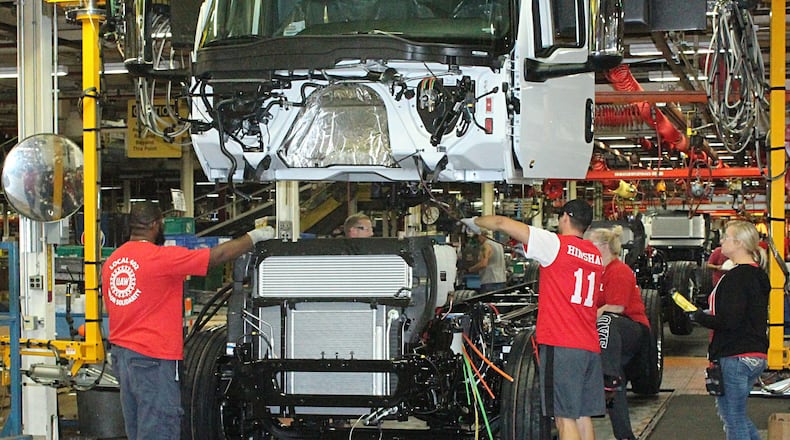The trend has been downward for several months. Orders for Class-8 trucks fell by 71 percent in May this year compared to May 2018, according to research firm FTR Transportation Intelligence. That marked “the lowest volume for Class 8 orders since July 2016 and the weakest month of May since 2009,” FTR said in early June.
Later, data showed that orders for Class 8 rigs had plunged by 81 percent in July this year compared to July last year, to 9,800 units, the lowest since 2010.
Former Navistar executive Jeff Saas — today a vice president of marketing for Hendrickson, a supplier of heavy-duty truck suspensions, brake systems and other parts — said no one should be shocked by the numbers.
“It’s an interesting question because the timing of truck sales is one that ebbs and flows,” Saas said.
Last year was a banner year for the industry. “We saw incredible truck orders and trailer orders coming in to the industry late last year,” Saas said.
With those orders in place, it’s understandable that orders in the first half of 2019 would be down, he said.
“So the net orders in the first half of 2019 have been slower, but that was anticipated because the backlogs of both Class 8 trucks and trailers were at all-time highs,” he said.
It’s an oversimplification to claim that the trade war or a slowing economy are impacting truck orders, he maintains.
“It’s just one data point, not looking at the big picture,” he said.
Last week, Lisle, Ill.-based Navistar International Corp. reported third quarter 2019 net income of $156 million, compared to third quarter 2018 net income of $170 million. Per-share earnings, however, were better than Wall Street expectations.
Navistar is expected to lay off more than 100 workers at it’s Springfield plant, the plant’s union announced Friday. The company’s Springfield plant employs 2,000 workers who specialize in building medium-duty trucks.
The company announced last month that production line rates will be reduced at the plant in order to realign production with current demand. Lyndi McMillan, a Navistar spokeswoman, said Friday that the number of layoffs had not yet been finalized.
Navistar did not say how many lines will be affected by this change or if any job losses will occur as a result.
“This cycle is normal for our business, and this is not a shift of production to other locations,” McMillan said in an email in August.
Todd Relitz, a sales account manager with McGregor Metalworking in Springfield, said his company does very little business in the heavy truck market. But the company is weathering its own challenges.
“We’ve seen softness in other markets, in the business we do for example with Honda, for car sales,” Relitz said.
In early August, Honda shut down a second-shift production line at its Marysville assembly plant for what will be “a few years,” the company. The automaker has said the move will not result in layoffs of permanent full-time employees.
Relitz said McGregor is also dealing with weakness in its lawn and garden and agricultural markets.
“With the flooding this spring and all that, the ag market is soft, too,” he said.
Saas emphasized that the Class 8 market is subject to recurring cycles, with years that are good and years that are down.
“Now, would we like to get record orders every month?” Absolutely,” he said. “But we also have been in this market, and in this industry for a long time, and we’ve seen the ups and downs.”
About the Author

